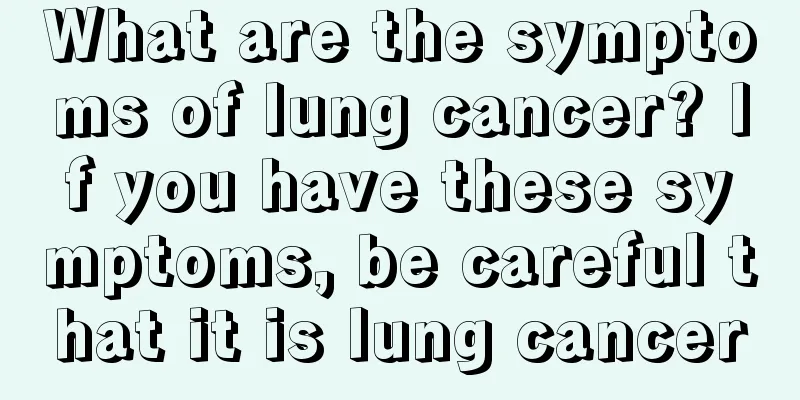What are the symptoms of lung cancer? If you have these symptoms, be careful that it is lung cancer

|
Lung cancer is a disease that can affect the quality of life of patients and is incurable. In fact, only after we understand and recognize the clinical symptoms of lung cancer can we conduct clinical observations. Timely observations can better help patients understand their condition, thereby alleviating the symptoms and pain of lung cancer and providing timely treatment. Clinically, lung cancer is a chronic wasting disease. After it occurs, it is always necessary to find appropriate ways to deal with and treat it. However, different situations may occur clinically, which requires comprehensive treatment to reduce pain. In short, experts recommend that you first recognize and understand the symptoms of lung cancer. First of all, for lung cancer patients, the first symptom that will appear after the disease occurs is cough. Generally speaking, if lung cancer patients use drugs to control the cough, the disease will not reach a certain purpose. However, clinically, it is also necessary to understand the nature of lung cancer in time. Only by understanding the nature of the cough can we understand the severity of the lung cancer. Blood in sputum or hemoptysis is also a common symptom of lung cancer, accounting for about 30% of the first symptoms. Because of the stimulation of cancer, this will cause patients to have blood in their sputum, especially in the later stages of the disease, when patients cough up blood, which will cause varying degrees of damage. Chest pain is also a common symptom of lung cancer, which is often manifested clinically as irregular dull pain or pain in the chest. In most cases, peripheral lung cancer invades the parietal pleura or chest wall, causing sharp and intermittent pleural pain, which, if continued to develop, will evolve into constant piercing pain. Lung cancer can cause a large amount of pleural effusion in patients, which will cause chest tightness, shortness of breath, and difficulty breathing, but the symptoms can be relieved after the fluid is drained. In fact, hoarseness may also occur in patients with lung cancer accompanied by cough, which requires clinical observation and timely finding of appropriate treatment methods. The above experts have summarized the relevant knowledge about lung cancer. For the patients themselves, comprehensive treatment is needed after the disease occurs. In addition, lung cancer can lead to more complications in the later stages. Therefore, clinically, the patients themselves need to improve their quality of life in a timely manner and reduce their pain. |
<<: What bad habits can cause liver cancer? Eight ways to prevent liver cancer
Recommend
There are red spots on the front and back of the chest
I guess many people have experienced acne on thei...
Which part should I massage for dizziness
Nowadays, people pay more and more attention to t...
Why do I feel anxious before meals?
For people with weak constitutions, dizziness, pa...
What are the symptoms of gallbladder cancer?
Gallbladder cancer is a very familiar disease ter...
Common early symptoms of cervical cancer include the following situations
Early symptoms of cervical cancer are generally n...
Methods of Traditional Chinese Medicine in treating lung cancer in hospitals
Most primary malignant tumors of the lung origina...
Can lobsters be eaten after being refrigerated?
Lobster is a seafood that many people love. It ca...
Bad habits and chronic diseases cause pancreatic cancer
With the increasing incidence of pancreatic cance...
Is left shoulder pain a sign of illness?
Shoulder pain is a very common phenomenon for peo...
Treatment of gingivitis
Gingivitis is a common inflammation, which mainly...
What physical signs does it mean when your feet suddenly become smelly?
Many people have the problem of smelly feet, but ...
Spots appear on my face when I'm exposed to the sun
Many people have spots on their faces. The presen...
Can traditional Chinese medicine hospitals cure colorectal cancer?
What are the TCM treatments for colorectal cancer...
I still feel thirsty even though I drink water frequently
Many people drink water every day, but they still...
What to do if the tendons hurt after a fracture
Fractures are a common occurrence in the human bo...









